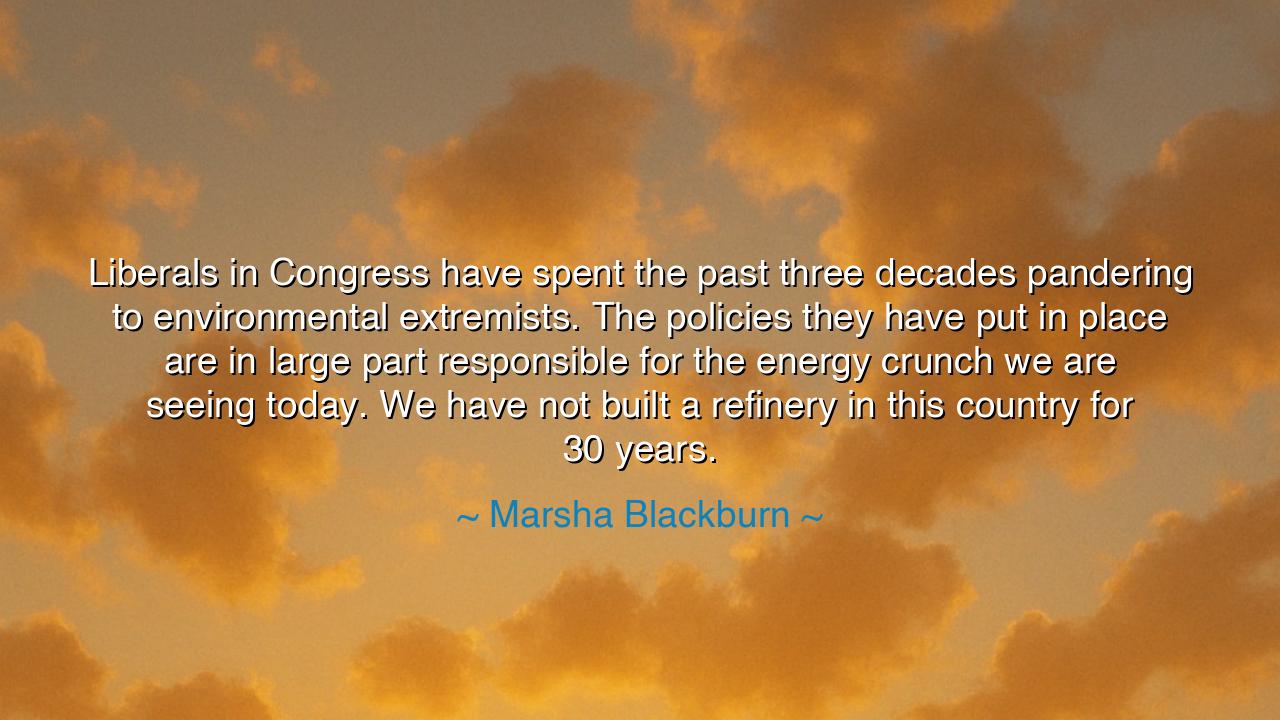
Liberals in Congress have spent the past three decades pandering
Liberals in Congress have spent the past three decades pandering to environmental extremists. The policies they have put in place are in large part responsible for the energy crunch we are seeing today. We have not built a refinery in this country for 30 years.






In the councils of old, elders warned that when a tribe quarrels over the hearth, the cookfire falters and the children go hungry. So when Marsha Blackburn declares, **“Liberals in Congress have spent the past three decades pandering to environmental extremists… The policies they have put in place are in large part responsible for the energy crunch we are seeing today. We have not built a refinery in this country for 30 years,” she speaks in the register of blame and alarm, claiming that long political indulgence has starved the nation’s furnaces. Whatever one thinks of her charge, the image is vivid: gates held too tightly, mills starved of fuel, lines forming at the shop of power. The saying circulates in collections of her remarks from the mid-2000s and 2010s, a moment when price spikes and supply strains made energy a shouting ground in American life.
To hear the sentence’s bones, divide it into three parts. First, a history: three decades of alleged pandering—a procession of rules and delays. Second, a consequence: an energy crunch, the pinch felt not in speeches but in kitchens, truck cabs, and factory floors. Third, an emblem: “We have not built a refinery in 30 years,” a single, sharp fact offered as proof that policy has withered capacity. In rhetoric old as the agora, Blackburn binds cause to effect and seals the bond with an example meant to be unanswerable.
Yet the elders would counsel: every emblem is a door, not a destination. The refinery stands for a tangle of things—permits, markets, lawsuits, neighborhood fears, boom-and-bust cycles, investor caution, and the public’s desire for clean air as well as cheap fuel. In some seasons, it is capital—not regulation—that hangs back; in others, it is rules that tighten the path. And in still others, technology changes the very nature of demand. Thus even a true emblem may only partly name the path that led to today. (Analysts often note, for example, that greenfield U.S. refineries have been vanishingly rare since the late 1970s, while expansions and upgrades did much of the work of adding capacity.)
Consider an instructive tale from another age. In the late nineteenth century, cities choked on coal smoke; lampblack stained lungs and stone. Reformers demanded cleaner air; magnates demanded freer hands. For a time, industry cried ruin if rules were tightened. But the city that married practicality to patience—encouraging taller stacks, better boilers, cleaner fuels—found that prosperity and breath could share a street. The lesson was not that one faction had been wholly right, but that balance, struck deliberately, could turn conflict into craft.
Blackburn’s saying, heard charitably, is a plea for policy that sees consequences end-to-end: if you bind the gates, be ready with new roads; if you forbid old fires, light new ones that burn cleaner; if you restrain the past, invest in the future at equal speed and scale. Heard skeptically, it risks shrinking a complex ledger to a single line, as if every price at the pump could be traced to one party’s environmental posture. Wisdom—elder wisdom—asks for fuller accounting: geology, geopolitics, technology, capital markets, community consent, and the steady pressure of public health.
From the proverb, draw a lesson fit for both builders and guardians. For builders: do not treat rules as enemies but as design constraints that sharpen invention; commit to transparency, safer siting, and genuine community benefit so that capacity and consent rise together. For guardians: pair every restriction with a replacement—efficiency gains, transmission lines, storage, clean generation, and workforce plans—so that prudence does not feel like poverty. Thus the hearth is kept both bright and breathable.
Let counsel become action. Citizens can press leaders to publish honest energy plans that show, year by year, how old capacity retires and new capacity arrives; how reliability, affordability, and cleanliness are balanced; how burdens are not piled on the same neighborhoods again. Lawmakers can speed permits for the infrastructure that delivers cleaner power—grids, pipelines for low-carbon fuels, carbon management—while enforcing standards that keep air healthy. Investors can price long-term risk honestly, backing projects that still make sense when the winds of policy shift. Do these things, and the quarrel over environmental virtue and energy need not end in famine; it can end, as the elders hoped, in a table set for many winters.
As for the line itself, remember its origin: a partisan trumpet from a particular hour, preserved in anthologies of quotations and echoed in later debates. Treat it as flint, not scripture—something to strike against the hard facts until sparks of understanding fly, guiding us toward choices that keep both lamp and lungs alive.






AAdministratorAdministrator
Welcome, honored guests. Please leave a comment, we will respond soon